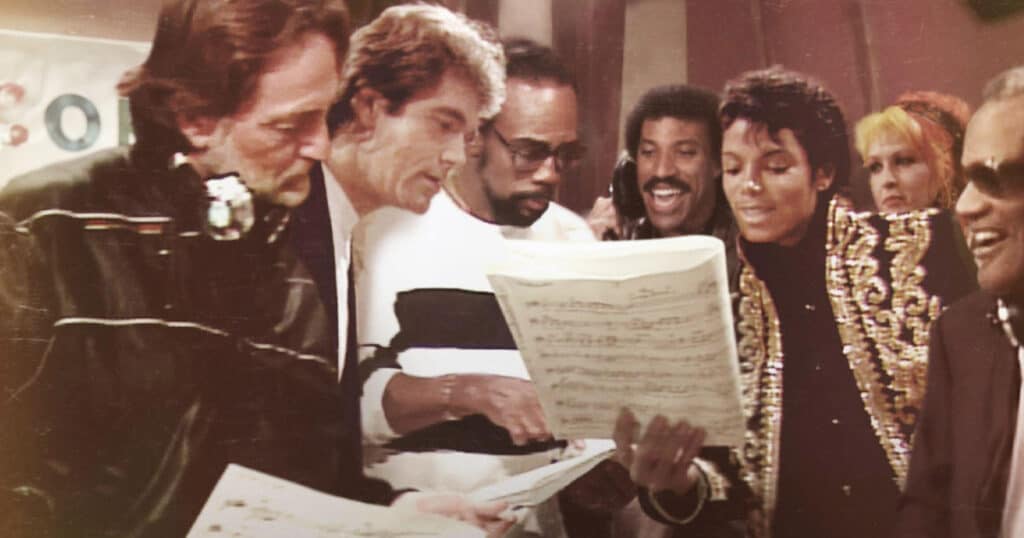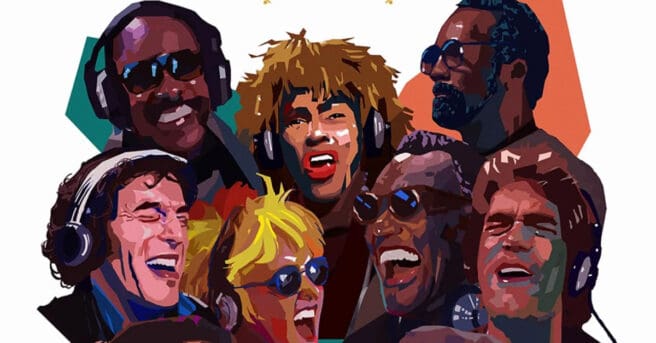

PLOT: In late 1984, inspired by the success of Band-Aid in the UK, legendary producer Quincy Jones decides to make a charity single including all of the biggest pop stars in the country. Due to the complicated schedules of all involved, they only have one evening to complete what will become one of the best-selling singles of all time, “We Are the World.”
REVIEW: If you’ve seen the music video for “We Are the World,” you’ll know that pretty much every pop-rock icon of the first half of the eighties was there for its recording. In addition to co-writers Michael Jackson and Lionel Ritchie, there was Huey Lewis, Hall & Oates, Diana Ross, Kenny Loggins, Stevie Wonder, Ray Charles, Willie Nelson, Bruce Springsteen, Bob Dylan, Kenny Rogers, Paul Simon, Steve Perry and so many more. Even Dan Aykroyd showed up singing in the chorus.
The song was a charity single designed to provide life-saving funds to those dying from famine in Africa, particularly in Ethiopia. The idea for charity singles and Live Aid came from Bob Geldof of the Boomtown Rats, with “Do They Know Its Christmas” earning tens of millions for famine relief in late ’84. Yet, in the United States, the song wasn’t (initially) a huge hit, although it’s become a Christmas staple since then. Thus, Quincy Jones, the most celebrated producer of the time, had the idea to do an American version. It just so happened that pretty much every big American star would be present at the American Music Awards on the evening of January 28th and would be in L. A and available for an all-night recording session.
As director Bao Nguyen’s documentary The Greatest Night in Pop reveals, Lionel Ritchie (also hosting the AMA) had to hustle for weeks and weeks to make the recording happen, with him and Michael Jackson only finishing the song days before the recording. Ritchie, who also produced the doc, is the main interviewee, as he fondly remembers his late manager Ken Kragen, who was instrumental in assembling the various acts that Quincy Jones would marshall on the day of the recording.

As Ritchie amusingly recalls, working with Jackson was intense, with Bubbles the Chimp roaming his estate and him almost getting bitten by MJ’s pet snake at one point. The challenges of the recording session are emphasized, with Stevie Wonder causing country star Waylon Jennings to flee the session when he decided there should be a bit sung in Swahili (they don’t speak Swahili in Ethiopia). It was up to Ritchie to massage egos, although he recalls virtually everyone was happy to participate.
Of the singers, Kenny Loggins, Bruce Springsteen, Cyndi Lauper, and Huey Lewis are around to remember what it was like doing the recording. Lewis was only supposed to be in the chorus, but he sang a verse when Prince was a no-show. Still, he was very intimidated by the many generation-defining singers around him and displays some rather touching humility. Ritchie remembers Bob Dylan being shy and overwhelmed, only to be personally coached and put at ease by Stevie Wonder, who was a fantastic mimic and could show Dylan precisely what he would sound like in the song. The footage is great, including an iconic shot of Kenny Rogers rolling up to the recording driving a DeLorean.
For the most part, the stories of the various singers are sweet, with Diana Ross remembered as particularly happy to be there, especially when she got to meet her favorite singer, Daryl Hall of Hall & Oates. Lionel Ritchie also remembers being blown away by Steve Perry’s voice. Yet, it’s not pure hagiography, with Cyndi Lauper remembered as almost dropping out at the eleventh hour due to her reservations over the song (which she admits to), plus Al Jarreau got drunk and couldn’t nail his part. In contrast, Sheila E remembers feeling used, conveying that she was just a placeholder for her then-boyfriend, Prince. When he didn’t show up and she realized no one really had a place for her, she bailed on the session.
Overall, though, it’s a sweet, inspiring account of a song that raised over $168 million (in 2024 dollars) for famine relief. As Springsteen admits in his section, it was a song that wasn’t designed as art but rather as a vehicle to reach as many people as possible, and in that, it succeeded. More than anything, it proves what a unique one-off it was, as it would be all but impossible to do now without the modern equivalent of a Ken Kragen or Quincy Jones to get everyone organized.
The Greatest Night in Pop hits Netflix on January 29th!
The post The Greatest Night in Pop (Sundance) Review appeared first on JoBlo.

Leave a Reply